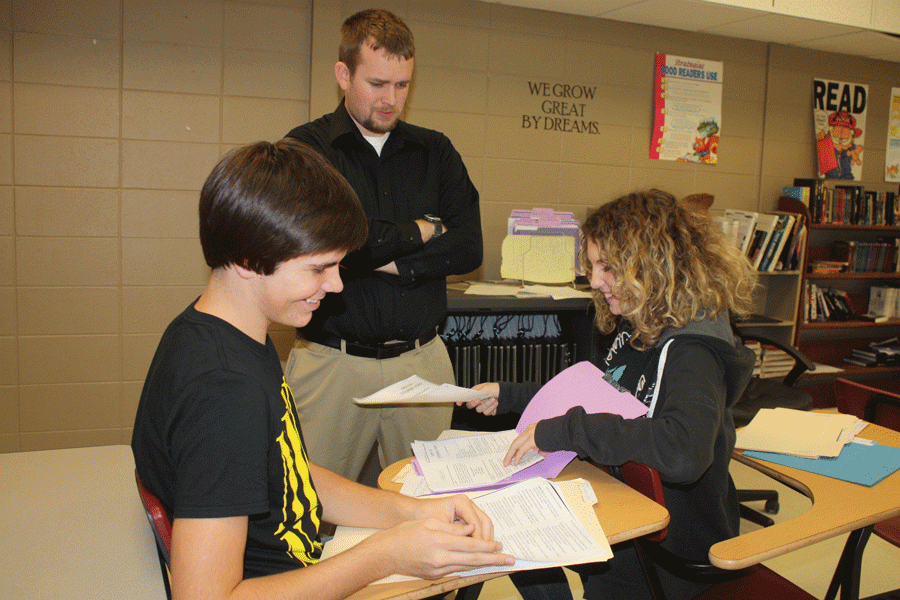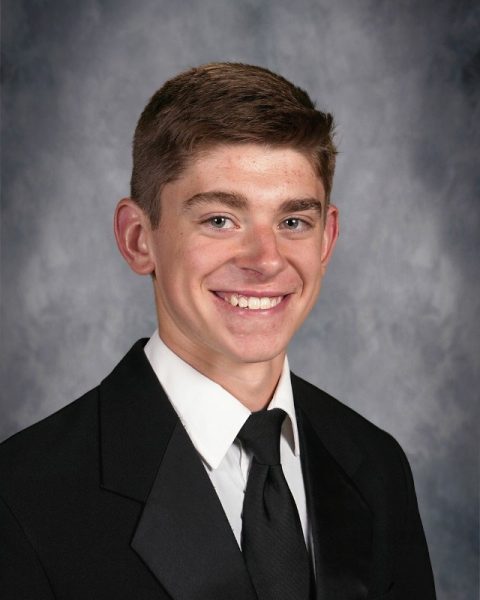Speech students overcome nerves to perform
Speech coach Nathan Hopkins helps speech students freshman Mason Knox and Alexia Young choose their next piece. Hopkins has been a speech coach for two years.
Speech team performers must deal with their nerves as they strive to perfect their performances.
“The hardest thing about speech is getting over the nerves of talking to strangers. Even if you have everything memorized, the nerves is what will get you in the end,” Senior Stephanie Fisher said. “You just kind of have to think of it less as ‘These people are judging me’ and see it more as ‘These people are specifically here to see what I can do.’ They’re not angry, just curious,” Fisher said. Fisher performs in poetry and duet and has already placed 6th in tournament .
However, not everyone gets nervous for the same reason. Senior Matt Stebbins said memorization is his most difficult obstacle.
“It kind of depends on who you are. You could be a person bad at memorizing, that’s definitely the hardest part. Or you’re a person bad at speaking, and if you are, then the whole thing is difficult. I fall into the memorization category,” Senior Matt Stebbins said. “To help, I find a piece that’s already been recorded somewhere and watch it over, and over, and over again until I get to the point where it’s stuck in my head. Eventually, I hate it so much, but it’s at the point where I know what I’m doing. Or I do the other option, which is much more fun, where I just know the basic storyline of what I’m doing and then I kind of just improv it all,” Stebbins said. Stebbins performs in Humorous Interpretation.
“The hardest things for me about speech is remembering what you have to say and finding time to practice, as well as the nerves of being up against other students and judges,” sophomore Hannah Chapman said. “When I get nervous, I just take a deep breath and realize that every other students is feeling the same thing. And my personality really helps with the nerves. I’m naturally talkative and I just like doing speech.” Chapman is to be a participant in Prose reading.
Those who have participated in a speech contest found success as well as ways they can improve.
Members of the speech team have competed against Osage, Knob Noster, Crest Ridge, Sacred Heart, Cole Camp, and various other schools all across Missouri.
Speech results this year have resulted in many finalists. Stephanie Fisher received sixth place in Poetry October 31 at Osage High School. Caitlin Easter reached finals in Dramatic Interpretation and received fifth place at Knob Noster November 7. Easter also finaled December 5, earning third place in Prose reading and fifth place in Dramatic Interpretation. Matthew Stebbins also placed in the December 5 contest, earning fifth place for Humorous Interpretation and sixth place in International Extemporaneous Speaking.
“In my last contest I did good. I got sixth place out of 40 something, which is good. I finaled.” Fisher said. “I don’t usually final, but I’ve come close to it before.”
“My results in my last speech contest were mediocre,” Stebbins said, “I mean, I think I did okay. It was a large school. It’s just that it was the second or third competition, and I haven’t been practicing.”
“I’ve participated in about 3 or 4 speech contests since I’ve been in speech,” Chapman said, “I remember making it to finals and being close to getting a medal. Like, I was the next one up. I got fourth place, almost third.”
Despite the nerves and rigorous memorizing, students still find ways to have fun in speech.
“I loved getting to know everyone in speech, as well as students from other schools.” Chapman said.
“Doing improv with my boyfriend was always fun because even though it’s a weird couple activity, we’ve always been good at following each others lead. I think couples make the best improv partners.” Fisher said
“There really is no single memory to sum speech up.” Stebbins said, “It all just gets slumped together in one great memory.”

Ally Estes is a senior with a passion for the liberal arts. She currently attends Warsaw High but plans on attending Graceland University in Iowa,...







